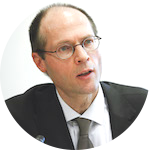When the climate strikes and harvests fail, as occurred in the US Midwest this summer, the consequences can be dire: prices start to spiral on tight world commodity markets and sooner or later these hikes filter through to local markets.
In low-income countries – and particularly those where imports account for a large share of the food supply – the results are devastating: the poorest can no longer afford to put food on the table, and worse, they cannot turn to the state for help.
The food price spikes of the last five years have shone a light on the vulnerability of the global food system to even small supply shocks, magnified by the reactions of market actors – and how easily large groups can slip into poverty and hunger as a result.
And they have also shone a light on the injustice of basic social protection being unavailable to nearly 80 per cent of the world’s poorest.
The injustice is particularly acute if considered that, for as little as two per cent of global GDP, basic social protection could be provided to all of the world’s poor.
However, the challenges in providing social protection are not only the basic running costs. For many poor states one major deterrent is the fear of putting schemes in place that they can afford today – but may not be able to afford tomorrow.
In India, the National Rural Employment Guarantee Act has provided since 2005 a legal guarantee of one hundred days of employment per year at a statutory wage for all adult members of rural households.
India and other emerging countries have been able to establish such schemes not only because of their growing internal resources, but also because they are large and therefore possess a degree of internal diversity: sudden increases in demand for social support typically occur on a regional rather than national level or affect only particular sectors or occupational groups, and therefore they can be managed, even in bad years.
But many smaller economies, those of least developed countries in particular, cannot afford the surging expenditure on social protection that is required in the wake of shocks such as droughts, floods, disease epidemics or sudden food price spikes that afflict large population groups, while simultaneously slashing a state’s tax and export earnings.
In order to break this deadlock, I have proposed the creation of a Global Fund for Social Protection.
A first function of the fund would be to close the funding shortfall for putting in place a social protection floor in least developed countries (LDCS); in parallel, the fund would help to underwrite these schemes against the risks of excess demand triggered by major shocks, either by advising LDCs on suitable private reinsurance options, subsidising their premiums, or acting as the reinsurer of last resort.
Some risks are simply too big for a single country – or even a single international organisation – to absorb: in 2006 the World Food Programme entered a contract with private reinsurer Axa Re which allows it to guarantee emergency assistance to Ethiopian farmers, when rainfall is found to be insufficient.
Thus, where severe drought hits and demand for support surges, reinsurance cover will kick in: in such cases, the financial markets complement the efforts of the state and the international community.
The logic of reinsurance is already well established – but unfortunately, given the risk profile of poor countries where large swathes of the population are vulnerable to the same shocks, they are often unable to secure coverage that is affordable and extensive enough from private markets.
These countries therefore need the support of an impartial international body to advise on, broker, or even provide this reinsurance cover – and this body needs the support and funding of wealthier countries in order to assume this crucial role.
In supporting the GFSP, States would be answering the calls of the ILO, Unicef, the G20 and the World Bank to make social protection global.
They would be fulfilling their human rights obligations, and transforming the shape of their development aid, making the volume of aid more predictable for them.
And all would be harvesting the multiplier effects of supporting incomes in developing countries, and continuing the promise of the Millennium Development Goals beyond their expiration in 2015.
Olivier De Schutter is the UN Special Rapporteur on the Right to Food. On 9 October he released a briefing note entitled ’Underwriting the poor: a Global Fund for Social Protection’. The briefing note was co-signed by Magdalena Sepúlveda, the UN Special Rapporteur on Extreme Poverty and Human Rights.









